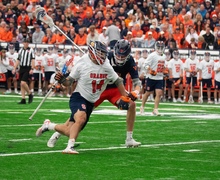2023 Bharati Awardees present dissertation research
Daily Orange File Photo
Mohammad Ebad Athar and Shanel Khaliq presented their dissertation research Tuesday afternoon.
Get the latest Syracuse news delivered right to your inbox.
Subscribe to our newsletter here.
In 2023, Syracuse University graduate students Mohammad Ebad Athar and Shanel Khaliq received the 30th Annual Bharati Memorial Award, which provides funding for graduate students interested in learning about and studying South Asia. The pair presented their dissertation research funded by the award Tuesday afternoon to around 20 people at the Maxwell School of Citizenship and Public Affairs.
Athar and Khaliq, both Ph.D. candidates, each had approximately 25 minutes to present their findings. Athar’s dissertation examined United States and South Asian legal and media discrimination, highlighting the broader impact of 9-11 on transnational South Asian communities. Khaliq discussed Islamabad’s public transport infrastructure and its subsequent impacts on mobility, class and gender inequality.
Matthew Baxter, the regional programs manager for Asia at Maxwell’s Moynihan Institute of Global Affairs, said the Bharati Awards were established to commemorate the legacy of Agehananda Bharati. Bharati, a former Maxwell professor of South Asian Studies and anthropology, was widely known for his work in the United States, Europe and India.
Baxter, who organized and opened the event, said the awards support “exceptional” graduate students who are working on research about South Asia. The award funds one to five doctoral students to support this research every year. The 2023 Bharati Awardee Memorial Presentation was the South Asia Center’s first event of the semester, Baxter said.
Following Baxter’s introduction, Athar presented his dissertation, “Manufactured Terror: The Securitization of South Asian Identity in the U.S. and the Persian Gulf.” Athar said his research in the two dissertation chapters emphasized the “full dimensions” of the War on Terror.
Athar began by presenting a case study of Mohammad Salman Hamdani, a Pakistani American and cadet for the New York City Police Department who died in the aftermath of 9/11. Hamdani was “wrongfully linked” as an accomplice in the attacks, according to NPR.
Athar presented a headline from the New York Post, which he said implied Hamdani hid from authorities. The headline reads, “Missing – or hiding? – mystery of NYPD cadet from Pakistan.”
“The emphasis on his Pakistani identity was important as well, suggesting that perhaps Hamdani was a terrorist because he was Pakistani,” Athar said.
In April 2002, as they were clearing the site after the attacks, Hamdani’s remains were found in the rubble, and police discovered Hamdani had rushed to help victims in the twin towers. He received a “hero’s burial” later that month.
The New York Post published a follow-up story about Hamdani’s honor in April 2002 with the headline, “Muslim hero honored at last: hundreds mourn police cadet who perished at WTC.”
“This story is important because it’s emblematic of the kinds of prejudice that Asian Americans face,” Athar said.
Despite the inclusion of a section that listed Hamdani’s name as an example of a Muslim-American hero and discussed condemning the “urge” to blame Arab and Muslim Americans, Athar said the act expanded the interrogation, surveillance and detention of thousands of South Asians.
Athar’s dissertation also examined the conditions in Qatar and Kuwait, which both utilize the Kafala system — a sponsorship program in which employers bring in foreign laborers and bind them to a contract for a specified period. Athar said there is no path to citizenship through the Kafala system.
“The reality for many South Asian workers in the Gulf today … is a life filled with physical abuse, sometimes sexual abuse, wage exploitation, labor exploitation of all kinds,” Athar said.
To conclude his presentation, Athar drew connections between the two transnational communities. He said both governments can exert direct control on South Asian populations with “impunity.”
In the “Public Transport Infrastructure: Understanding Class, Gender and Environmental Inequality in Urban Pakistan” dissertation, Khaliq emphasized the “vital role” of public transportation in society, but also how the design and planning of public transport often centers the needs of some over others, signaling the state’s priorities.
Khaliq focused on Islamabad and its various modes of public transport to answer three research areas: examining the planning of public transport infrastructure, gender and class differences through experiences with public transport and environmental inequality and vulnerability.
Khaliq found that physical mobility remains a bigger challenge for women compared to men, as almost every woman she interviewed said they had experienced sexual harassment during their commute whether walking or using public transportation.
“In my interviews with a lot of the state officials … they were not as tuned to the sort of infrastructural aspects which can help include more women into not just the workforce, but include more women to use public transport without having a lot of fear,” Khaliq said.
In her research questions, Khaliq said she found state machinery does not have a larger vision of the city under which transportation planning happens. She said cities must also engage with the people of the city instead of donors to understand what makes a project sustainable.
“I argue that the urban transportation planning — if it is to serve the needs of the most marginalized — has to involve sociological and ecological input,” Khaliq said.
Published on January 23, 2024 at 10:28 pm
Contact Kendall: [email protected]





